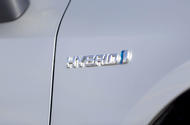Hybrids outsold EVs by almost 2:1 in 2023’s private market; overall EV sales inflated by incentivised fleet market
The lumpy progress on the journey to electric cars is favouring hybrids as a transition technology, particularly when chasing private buyers.
Ford, for example, has become a recent advocate of petrol-electric drivetrains as it works out how it’s going to match the likes of Tesla and the Chinese on EV costs. “Hybrids will play an increasingly important role in our industry’s transition and will be here for the long run,” said Jim Farley, Ford CEO, earlier this month.
In the US Ford is pushing hybrid technology for its pickup customers as a cost saving. “They can quickly evaluate the breakeven between ICE and a hybrid on the showroom floor,” Farley said. “The math for an EV customer is a little bit more opaque than what we see on hybrid”.
Crucially for Ford, the maths are also much better for the company. “Margins on hybrids are closer to ICE, much higher than EV margins,” Farley said.
The sums on full hybrids – as opposed to plug-in hybrids – are also becoming more compelling for customers in the UK, particularly those buying with their own money. Last year just under 240,000 hybrids were registered in the UK, according to figures from the SMMT. Toyota was out in front, with Nissan a distant second.
Crucially, over half of those hybrids were privately bought as opposed to just a quarter for plug-in hybrids and an even smaller 23% for EVs.
In fact, within private sales hybrids outsold EVs by almost 2:1 last year, despite a much higher overall sales tally for EVs.
The potential CO2 reduction for hybrids isn’t as good as those for EVs and plug-in hybrids, reducing their appeal to tax-incentivised business drivers.
However the smaller battery both reduces the costs and allows it to be packaged in a smaller vehicle than is feasible for a plug-in hybrid, making it a cost-effective alternative for fuel efficient driving. And as Ford has pointed out, the margins are far better than EVs.
Petrol electric drivetrains are becoming more common. MG has said its next MG3 small car – unveiled at the Geneva Motor Show on Monday – will be a hybrid, putting it head to head against the Toyota Yaris, the UK’s best-selling hybrid last year, and the Renault Clio E-Tech.
MG has made its biggest impact selling electric vehicles like the MG4 compact, but it’s also at heart a budget brand and couldn’t make the sums work on a small EV. “Developing a small electric car is only marginally cheaper than developing a bigger car,” UK commercial director Guy Pigounakis told Autocar. “Half the price is battery so it becomes a £25,000 car which is unaffordable”.
MG is a newcomer to hybrid tech, which so far has been adopted by only a handful of brands, including Toyota, Lexus, Nissan, Renault, Dacia, Honda, Ford, Hyundai and Kia. Toyota has also lent its tech to fellow Japanese manufacturers Mazda, Suzuki and Subaru.
Last year the four top-selling hybrids were Toyotas, with the Nissan Qashqai e-Power in fifth and the Hyundai Tucson in sixth.
Upcoming hybrid launches include the Renault Symbioz compact SUV in spring, as well as the new Dacia Duster. MG has also said its new hybrid drivetrain will expand to small and compact SUVs.
Nissan’s pivot from diesel to its e-Power and Renault sourced E-Tech petrol-electric system has vastly increased the number of hybrid cars built in this country. Last year 46,292 of the hybrids we bought were also manufactured here, when combining the output of both Nissan in Sunderland and Toyota in Derby, where it builds the Corolla.
Hybrids might not be the magic bullet for manufacturers in the battle to reduce their average CO2 in the way that plug-in hybrids are, but they still make a sizeable impact, particularly when it comes to selling large amounts of small cars. For example the current MG3 is rated as emitting 147g/km of CO2, while the Chinese-owned company claims the new model will reduce that to 100g/km.
Hybrids are eating into petrol sales at the lower end in the way that plug-in hybrids are replacing diesel at the larger and more premium end of the market.
By force of legislation if nothing else, EVs will remain the dominant growth force. For example the best-selling EV in January in the UK was not a Tesla or a VW but the Toyota BZ4X, demonstrating that even the staunchest of hybrid advocates can’t dodge the force of law.
However hybrids are poised to take advantage of any slowdown in the electric revolution. “If we do see a pause in Europe BEV growth this year that could be good for combustion engines in general and for diesel, but hybrids are probably best placed to benefit,” Al Bedwell, head of powertrain analysis at market researchers GlobalData, told Autocar.
The question is what happens later in the decade in the UK and Europe when the combustion engine in whatever form becomes a luxury for carmakers to sell, given the demands of the ZEV mandate and CAFE [corporate average fuel economy] standards to sell ever higher proportions of electric cars.
Will affordable hybrids be axed in favour of small EVs, leaving the floor clear for larger and higher-margin plug-in hybrids? The carmakers will be doing the sums very carefully indeed.






